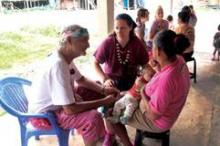We are in the midst of enormous changes in health care delivery. Implementation of the 2010 Patient Protection and Affordable Care Act will make health care accessible to more people than ever before, and ushers in a cultural shift from a prohibitively expensive interventional health care model to one based on prediction and prevention.
Instead of waiting to get sick and seeking expensive urgent care, we are moving toward identifying vulnerable patient populations early and encouraging them to become active participants in maintaining their health. Whether you like it or not, the Affordable Care Act (or some modification of it) is here to stay, because we simply can’t afford the 20% of our gross domestic product that health care costs us, and it’s not making us any healthier. Psychiatry is not well positioned to respond to this cultural shift, because as a specialty, we are moving in the opposite direction, creating more illnesses and prescribing more drugs. Patients only come to see us now as a last resort because they know we will label them with a disease and prescribe drugs.
Twenty-five percent of all Americans are now diagnosed with a mental illness, and with the recent publication of the DSM-5 and its record-breaking number of mental illnesses, soon 50% of the population might have a diagnosable mental illness. We are perpetuating the myth that if you are feeling anything other than wonderful in every moment, you might be suffering from a mental illness. We are "psychopathologizing" the ordinary ups and downs of the human experience and promoting pills for whatever ails the patient. I believe we would reduce the incidence of mental illness in this country by 90% if we prohibited direct-to-consumer advertising by pharmaceutical companies.
The message to the patient: Are you anxious, shy, sad? Can’t stay focused or can’t stay awake? If so, you could have a disease for which there is a drug (nowadays often more than one). Such messages are good for business, because we’re reimbursed better if we see four patients an hour for 15-minute medication checks than we do for an hour-long psychotherapy session. We are spending less time listening and establishing an intimate rapport, even though this is what most of us like best about what we do and understand as an important aspect of our healing power. Can we do both? Is it possible to make a soulful, human connection in a short time, and could this reduce an epidemic of overprescribing? I believe we can if we expand the ways in which we engage people – and in doing so, move into the new prevention paradigm.
In addition to my degreed credentials, I also am a clown and proudly serve as chief of community mental health at Gesundheit! Institute in Hillsboro, W.Va. The clown/fool/jester/trickster is an archetypal human characteristic that has served the purpose of lightening mood, diffusing anxiety, helping patients look at the familiar from a new perspective. The character can serve as a sacred healer. I clown all over the world with Dr. Patch Adams, perhaps the world’s most recognized humanitarian clown and founder of Gesundheit! Last year, I discussed a 20-minute mental health clinic in which I participated on the streets of Iquitos, Peru.
We did it again this year in Iquitos, and people lined up to see the clown-clinicians; they sat in an open space and talked for 20 minutes to someone they knew was listening to them. Clinicians heard gut-wrenching stories of suffering and challenges, helped people identify their strengths, applauded their resilience, gave advice, and blessed them. Patients felt better, and the clinicians felt better, because it doesn’t take long to make an intimate connection if you are truly present. It is in those moments that we are reminded of our shared humanity and that dreams are possible.
I’m thinking of bringing the Gesundheit! Global Outreach or (GO!) clowns to a mall in America and conducting such mental health clinics. Clowns would play, perform, sit in silence, and talk to anybody who wanted to right out in the open without charge. There would be neither signing of HIPAA compliance forms, nor making diagnoses, nor prescribing drugs. The idea would be to provide clown healers who might inspire people to see their lives from a different perspective.



